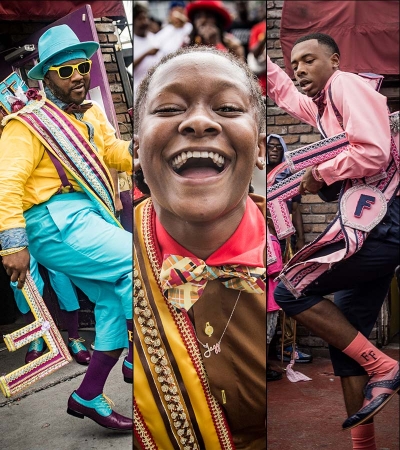Derrick: We started Footwerk Family from all the guys and girls who just be jumping on the sidelines—to have a club of our own. It’s everybody from everywhere. It’s uptown, downtown. You could be from Atlanta, New York. It don’t matter—you’re family.
Jeremy: It’s like a real family. We’re all close. We all love music.
Derrick: I’m Treme, Ninth Ward, Iberville, all over. I don’t have no particular spot.
Jazz: You mixed.
Derrick: Yeah, I just say I’m downtown. I grew up around music all my life around with my mom, Trina Carter. I was always close knit with Sudan Social and Pleasure Club because the brother of my mom’s best friend, Sheborah “Bo Baby” Gaddies, Adrian “Coach Teedy” Gaddies, is one of the founders and designers of the club. Sheborah and my mom had their own club one time—Downtown Kings and Queens. When they came out, their colors were turquoise, purple, and yellow. When we were getting ready for our first parade in 2016, Sheborah passed away. I dedicated our colors, turquoise, purple, and yellow, to her, my mom, and them. Their first year and our first year were the same colors.
Jazz: I grew up in the Treme area, just as well as the rest of my family. My great-grandfather was Chester Jones. My grandfather, Oswald Jones, is the grand marshal with the Treme Brass Band. Benny Jones, the leader of the Treme Brass Band, is my uncle. My daddy is Corey Henry. He was the leader of the Lil Rascals Brass Band. Most of their members ended up dying; that’s how that band broke apart. He’s played with Rebirth Brass Band, the Dirty Dozen. He was the lead horn player with Galactic funk band, and right now, he has his own band called Corey Henry and the Treme Funktet.
In New Orleans, there are a lot of trombone players who are calling the shots. Big Sam, Glen David Andrews, Trombone Shorty. I was trying to play trombone at three years old. After Hurricane Katrina, they had a non-profit organization called The Roots of Music Marching Crusaders, which was founded by Derrick Tabb from the Rebirth Brass Band and Allison Reinhart. My daddy is real close with Derrick. They grew up together, and he asked me did I want to play in the band. That’s where I really started playing out with people and being able to learn and proceed far with music. I played clarinet at first. I didn’t care for that at all. That’s not me. Then I went on to play trumpet. That was more of my thing.
I’ve been playing with the Original Pinettes Brass Band, which is an all-female brass band, since I was 14 years old. I am 24 now, so, yeah, it’s been a minute. We definitely have come from traditional as far as Treme Brass Band or Olympia Brass Band. All of those are more traditional bands. They do black and white gigs all the time. That’s the uniform for the with the hat, bow tie, belt, black pants, black shoes, white shirt.
Jeremy: I grew up in the Sixth Ward on St. Philip and Dorgenois. My dad was one of the founders of Revolution. I started out second lining when I four years old until I was about ten. I stopped cause I was deep into basketball. I didn’t have time to really do second line things. I came back second lining when I was about 16 when I started parading with Chosen Few for about two years. They were more traditional. No floats. When you’re really deep into that culture, you don’t want to hear New Orleans bounce music right in front you or right behind you. That’s not second lining.
Jazz: When I was about four, I paraded with the Money Wasters. I only paraded with the club a few years, but I didn’t stop going to second lines every Sunday. That’s like a habit. I ain’t missing no second line. That’s how I encountered Derrick. He was like, “We need more girls in the group.” It might have been his daughter, Sage and…who else, Dee Dee?
Derrick: Uh-huh.
Jazz: It was kind of too late to parade that year because they already had their stuff made, so I waited a year, which was last year. That was my first year back second lining in a group since I was small. I had a blast. I was high on life.
Dancing on the Side Line
Jeremy: It’s Sunday Fun Day. It’s like no strict limits for four hours. You can do whatever you want.
Jazz: Four hours straight. You got to be here. You have to live in this experience. People moving and knocking and rocking, falling, rolling, and crawling on the ground. Climbing on stuff! Horses!
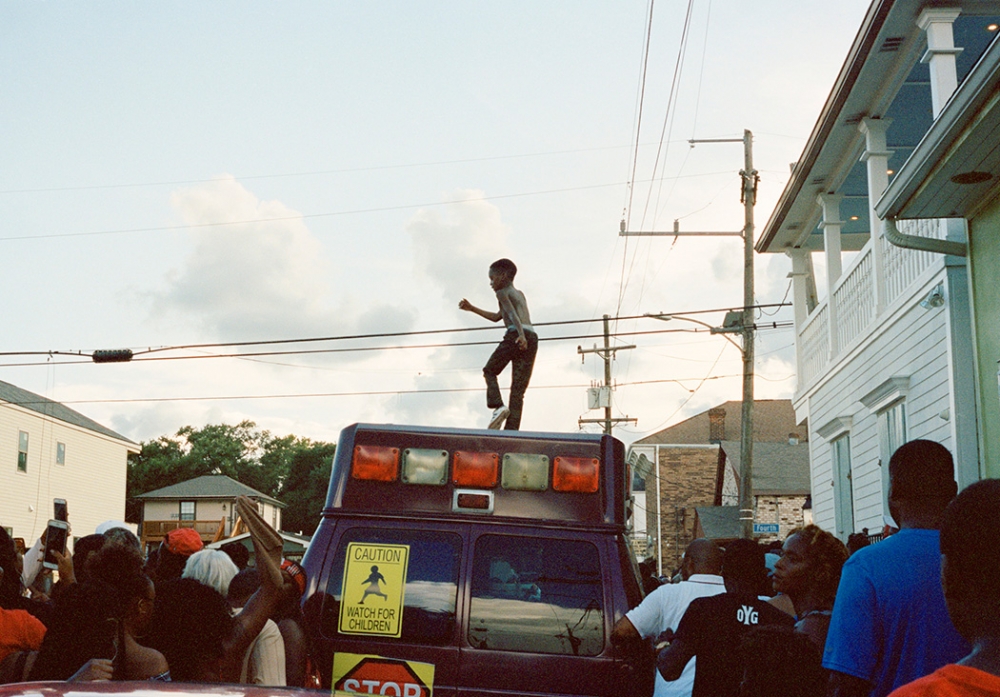
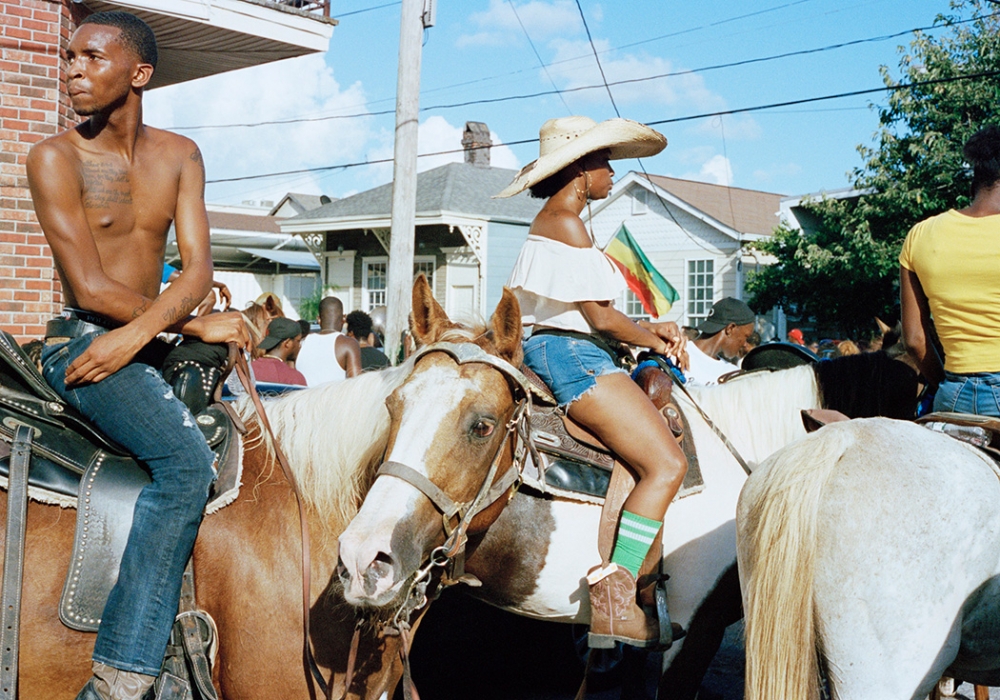
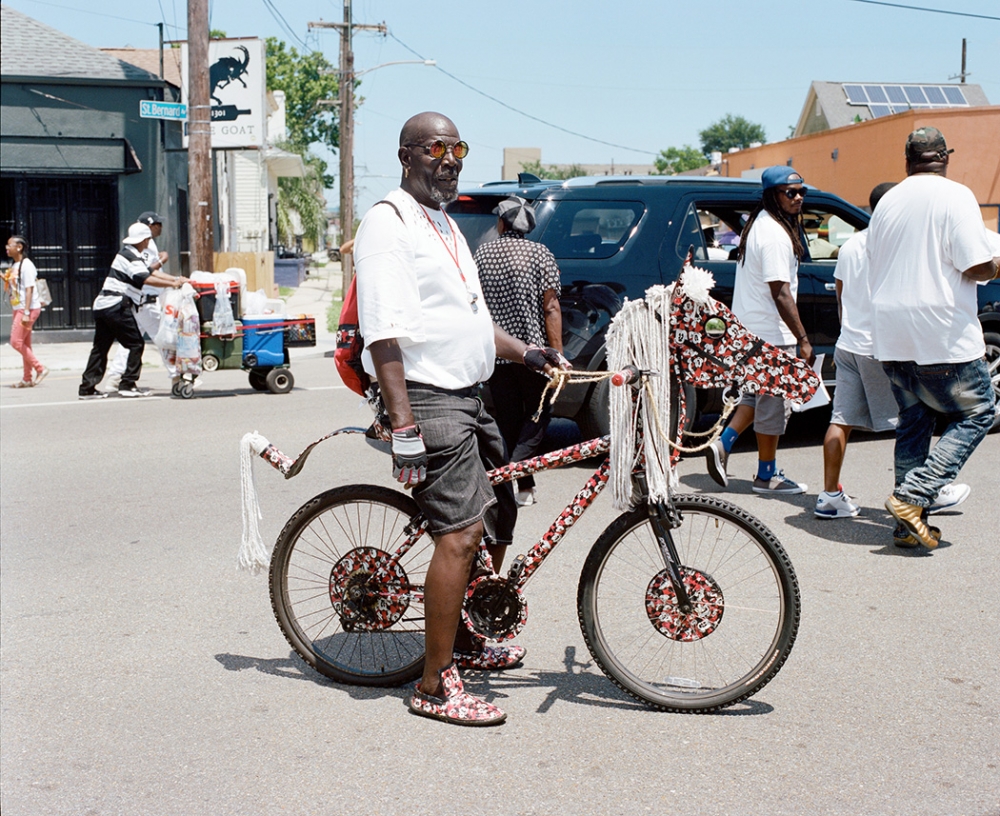
Jeremy: Food trucks, motorbike turning in the middle of the street. Car burning rubber. Police just…
Jazz: They’re there to protect.
Derrick: The motorcycles that follow the parade are cool but like I would rather them be like a little bit off the street. We’ll be rolling up the street and then next thing you know, you’re trampling over somebody’s bike or getting your leg burned on one cause you didn’t see it. You know, “A parade route coming this way! Can you back up a little bit or something?”
Jeremy: When I was in college at Southeastern, we wrote a paper about ourselves, and my English professor was from North Dakota, read my paper and she was surprised. She came down here to a second line on a Sunday and she’s been coming ever since.
Jazz: On the sidewalk, close to the band, you gotta move, baby, or you gonna get trampled.
Jeremy: There’s no such thing as just walking a second line.
Jazz: You gotta get out the way! You’ll hear people say, “If you ain’t gonna move, get the fuck on out the way!” [Laughter] Everybody know. It ain’t no secret. Right by the rope, you gotta keep up.
Jeremy: It’s made for dancing. That’s just what it is.
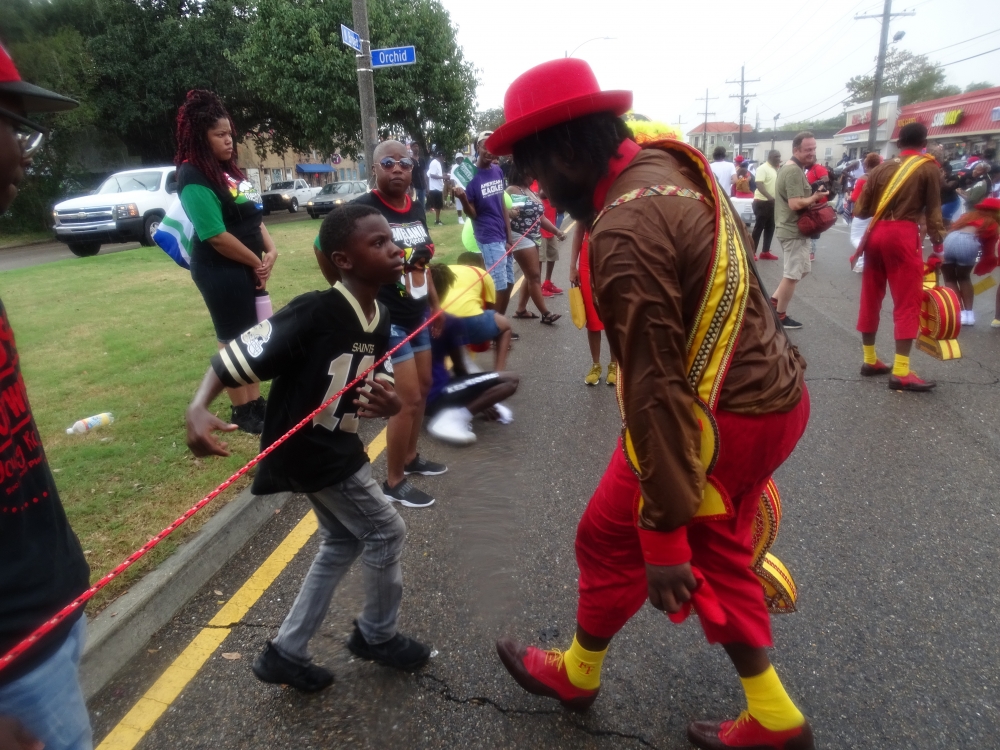
Jazz: Or behind the band.
Jeremy: The sidewalk is like a stage and all light shining over there.
Derrick: Especially when you get on a wide-open porch—that’s your stage right there. You show off for anybody and everybody.
Jeremy: With some people, it’s like second lining turned into a competition. We just never fell into that type of stuff.
Derrick: It’s all love. There’s never no: “Oh, I’m better than you.” We all equal.
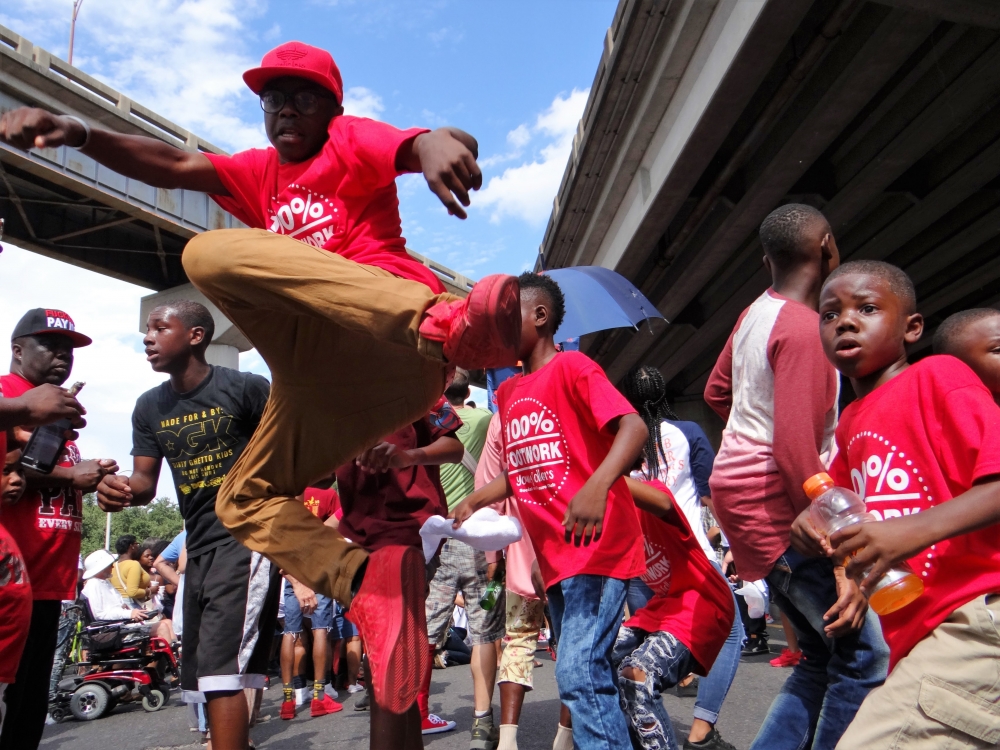
Jeremy: When you’re around it for so long, you know there’s no exact way how to second line. There’s none of that. It’s just you out there having fun with other people. We just always stuck to ourselves and roll together.
Jazz: Right. A lot of people think there’s a way to do it. “This person taking my moves!” If you go back in time, these moves that we’re doing today are recycled. These people been doing these moves. My grandpa could do a split—I can’t even do a split—and he’s like 70 years old. This stuff is not new. We funked it up, gave it a little spice.
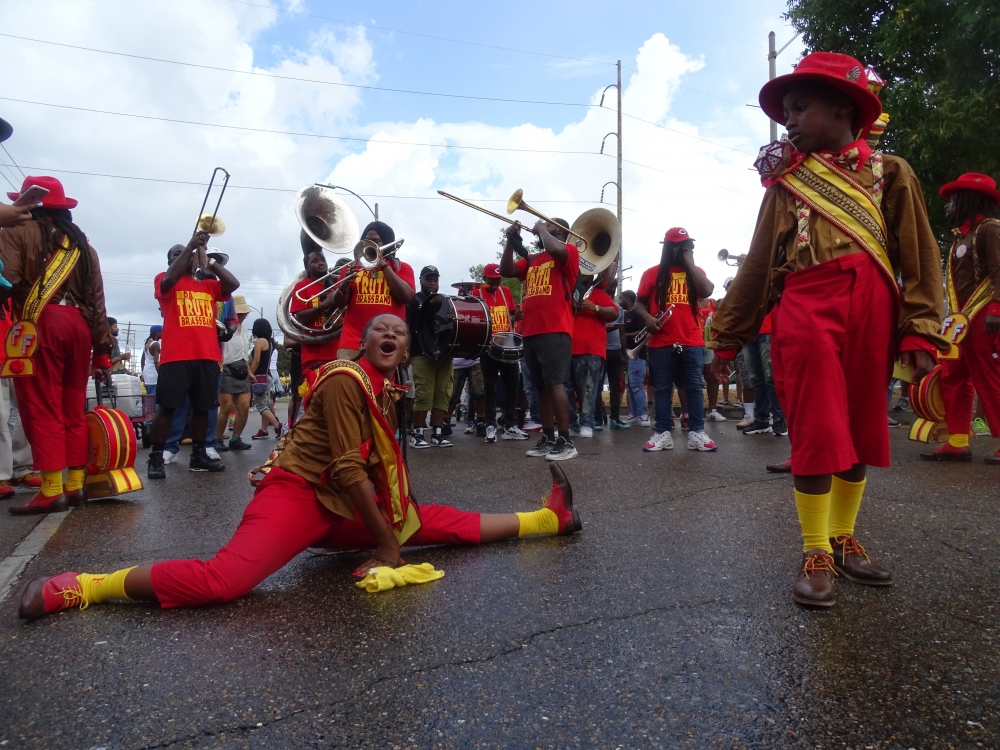
Dressing for a Second Line
Jazz: How you dress for a second line depends on where you come from. I done seen Jeremy come to a second line in church clothes and shoes. I done come from a gig in black and white out here. All black coming from a funeral straight to the second line.
Jeremy: If we’re downtown and it’s a Sixth Ward second line, the Treme area…
Jazz: Oh, you’re cutting up. You shine.
Jeremy: You coming clean. You’re dressed up, button down shirt, some slacks, nice dress shoes with one of your pieces that you made from your group. That’s just how we dress when we’re downtown. When you’re from the Treme area, when someone from your hood is coming out in their second line group, that’s how you pay respect to them. It’s not that we’re just dressing up and want to look better than them. That’s how we acknowledge each other. We could look on the sidewalk and see someone from another club. They’re going to be dressed in their clothes as well. When we go uptown, we don’t dress like that cause that’s not our area. We go in regular clothes. Uptown and downtown culture is totally different.
Derrick: Right.
Jeremy: But I’m not gonna lie. At certain second lines, the whole city’s going to want to dress out.
Jazz: CTC, Sidewalk Steppers…
Jeremy: The Sidewalk Steppers parade is like a fashion show. You’re gonna see everybody out there from your mama to your grandpa, aunties, uncles. Everybody go and buy a ‘fit for it.
Jazz: All the way down to a newborn baby.
Jeremy: When you come to our second line with Family Ties, everybody gonna show how they dress cause it’s the first downtown second line of the season. Everybody knows the whole city’s coming out. Everybody want to be fresh. Everybody want to look good; to impress.
Starting a New Club
Derrick: My mom works at Delgado with the president and vice president of Family Ties. She told them I wanted to start a club. I went to my mom’s job, and we had a talk. The only thing they kept asking was, “Are you serious?” I’m like, “Yeah, I’m serious!” They gave me a set price and we just went from there. They was more excited than me. And that’s how history began.
Jeremy: At first, a lot of people didn’t have faith in us.
Derrick: At all. A lot of people who are known around this city for second lining were all invited to this group. Everybody thought that it was gonna be a bust. You can ask somebody do they want to do something but that don’t mean that they’re going to do it. I was paying for this, and I was paying for that, and I’m making our accessories. I learned from Thomas, the president of Chosen Few, and I learned a little bit from Adrian from Sudan. I’m doing all this myself to keep everything in-house.
Jeremy: When you go to a downtown second line, you going to look for three things: you’re gonna look for the accessories, the clothes, and the shoes. If you don’t have that together, you don’t have nothin’ really. That’s just how we serious we take it downtown. We really take our time into making work. Money might go even a little low just for your club to do what they have to do.
When I first started with the club, I was working, but I had to pay rent and for a lot of stuff for my kids. I didn’t really have the money to up and just give, give, give. Derrick really helped me out because I wanted to be a part of it. Life hits you, and at that point, you have to make a choice. He knew how serious I was with second lining, and said, “Bra, I’ll pay this for ya.” I think the first year I probably didn’t pay nothing.
Derrick: Yeah, you didn’t. They had a lot of clubs waiting on us to tip over. I can’t allow that to happen. We can’t allow that to happen. That would be defeating the purpose of us putting our blood, sweat, and tears behind it from the first place.
Jeremy: I saw Derrick by himself doing everything, and I’m like “D, I’ll come help you.” You have ten to 12 people in the club, and you have to make a streamer for everybody, you have to make a fan for everybody. And your stuff better be to perfection. Everybody is looking to see. The day before, we were probably up a full 24 hours trying to finish up everything—putting touches here and there. By the time we’re done, it’s seven in the morning.
Jazz: Ain’t no sleep.
Jeremy: We’re just going straight to the bar where we’re about to come out at and it’s time to roll. The first year, I actually cried.
Derrick: Coming out the door, I can’t explain that feeling.
Jazz: It’s an adrenaline rush.
Derrick: It’s like everything go black. You hear the band, but you don’t see nothing but what’s in front you. Some folks actually be scared to come out the door because it’s just all eyes on you, so you have to come out and roll.
Jazz: You ain’t gotta look at me, boy. I’m not scared.
Derrick: We’re still trying to keep it traditional with like a bowtie or maybe a tie and suspenders. We just took it on a new school level as far as cutting the pants into knickerbockers so you can see the socks with the prints on them.
Jeremy: We wanted to look a little different. I think, to be honest, last year, our last parade is when people started to really respect us.
Derrick: Real talk.
Jeremy: Two years in a row, we came out with two “F’s.” We thought about doing it again, and we’re like, “Nah.” We came out with baskets and fans, and when people seen that, a lot of people thought that someone else made it for us. We made everything on our own. Everything.
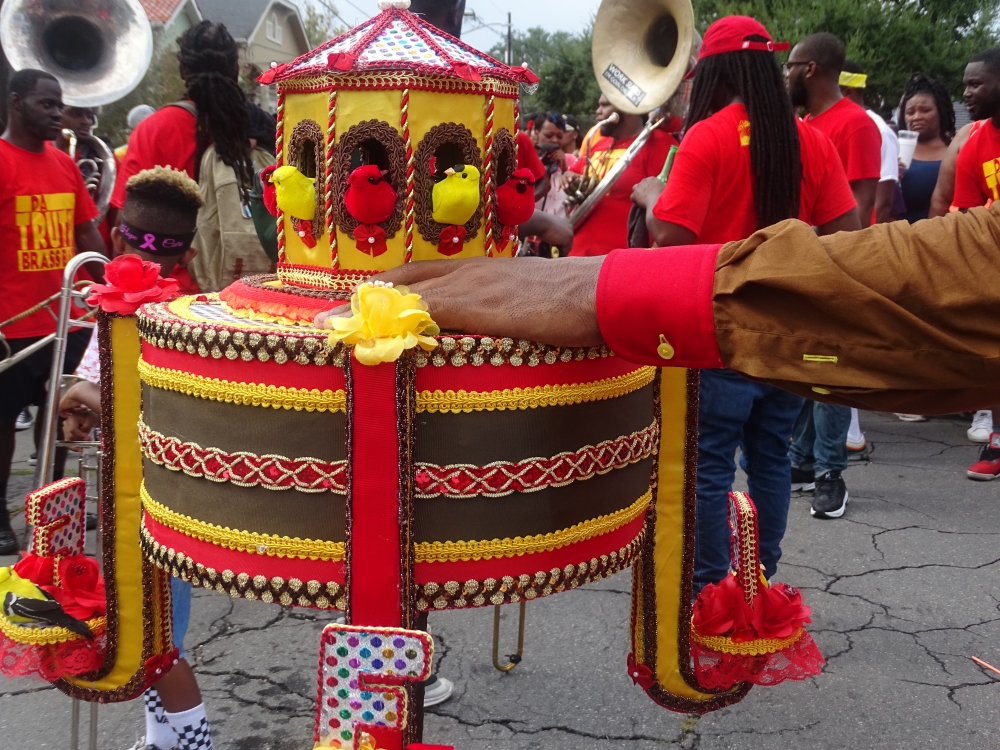
Derrick: The year we wore the red and yellow, I cried right under the bridge coming in. I was looking at a picture of my cousin, Carter. He got killed a couple years ago and I wanted to do something for him, so I decorated a big ole picture of him. I know he would have liked that. His brother told me something in my ear and then the tears just started pouring because I’m looking all around. We got kids and older folks in it, and everybody’s in uniform. You know, like back in the day when everybody went to take that family portrait and they had the same thing on.
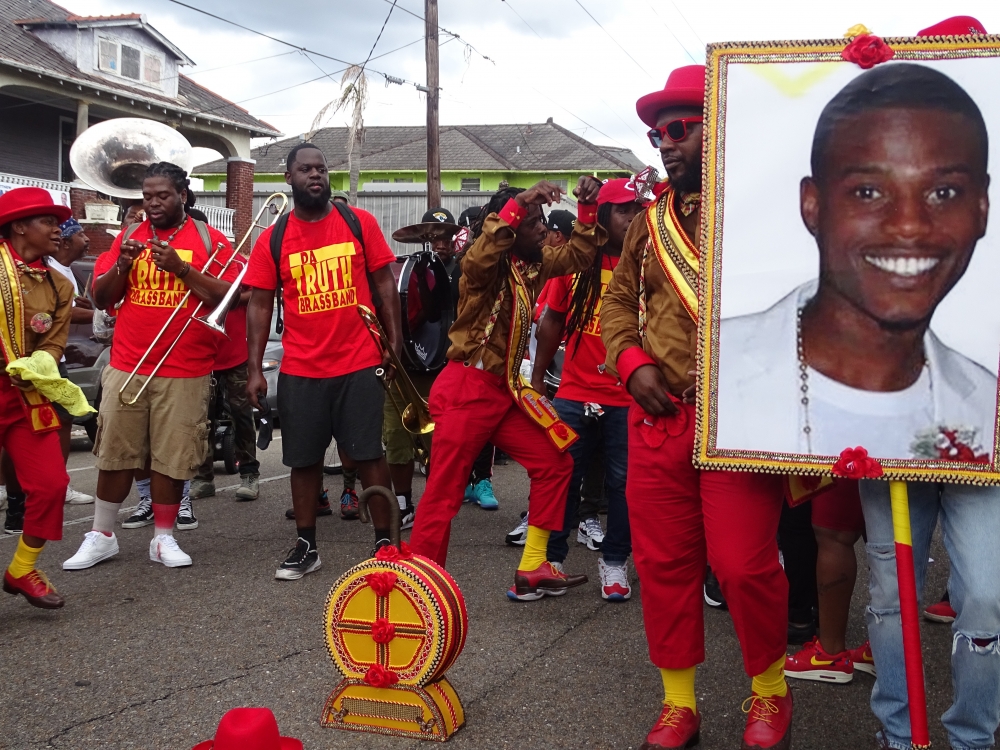
Jeremy: The route we do with Family Ties is between Sixth and Seventh Ward, so we’ll go through Ursuline, Claiborne, Broad, St. Bernard, Orleans, Claiborne.
Jazz: Main streets.
Jeremy: We wish we could get our own date though.
Derrick: Oh yeah. Five years. We’re supposed to parade for five years and then we can actually get our own date. I know we’ll be alright because we’re gonna keep it traditional. We’re not going to have the big floats and all that music from the DJs.
Jeremy: We don’t want all that. Strictly second line music. Strictly band music. That’s what we’re there for. That’s what we grew up around.
Jazz: We go with Da Truth.
Jeremy: Da Truth Brass Band.
Derrick: “Da Truth shall set you free.”
Jeremy: They do it all.
Derrick: I don’t know if many clubs do it, but I give the band a list of like the first hour and a half, and we get the old, traditional music from Treme, Rebirth, Dirty Dozen, and then after that they can open up the playbook and we can go from there. We end it with everything they have in their arsenal. And then the last song will be like a number one traditional song like “Put Your Right Foot Forward” and we close it out.
Jazz: Since the brass band community has grown, now we’ve had a bunch of the younger generations, and the genre of music has changed. For instance, at a Black Men of Labor second line you might hear “I’ll Fly Away,” “Blackbird,” “Food Stamps”— those type of things which is more traditional songs.
At a parade nowadays, you might hear more radio songs. I’m not saying it’s a problem or anything, but if you been in this culture and you grew up in this, you know that that’s not brass band music—you know that’s not traditional music. For somebody like me, I don’t want to hear that the whole four hours cause I’m gonna leave.
My daddy, he like a mix of brass band and funk, so maybe he’ll do like “Let’s Go Get ‘Em,” “Ooh Nah Nay,” but he’s more of a stage performer, so his band don’t do second lines. He’ll do them with other bands. The music switches just from people trying to experiment and find new songs. Some of the newer bands have their own music. TBC has their album out. The Pinettes are working on an album. I’m not going to say bands don’t play their own songs, but they play what the people want. You know how they say, “Give the people what they want?” That’s what they’re there for.
Jeremy: I think it’s cause the crowds are starting to change now. A lot more young people come out to second lines now, and I want to say females like to hear certain songs, but I can’t dance to that.
Jazz: I can’t dance to that!
Jeremy: There’s no dancing to that. It’s like you’re forcing yourself to dance rather than…
Jazz: Feeling it.
Jeremy: When you hear traditional music, it’s going to make you move. You’ll feel it in your body. It’s really some spiritual type of stuff. I can’t second line down the street to a Beyonce song.
Jazz: Different vibe.
Jeremy: That’s why we strictly choose Da Truth Brass Band. They’re strictly traditional music and whatever they make for themselves. They make their own music. That’s why we love them.
A Lot of People We Will Not See Again
Jeremy: Now that corona done hit us, Ms. Corona, we not second lining, we barely hear no brass bands, so everybody starting to see, “Damn, we’ve been taking this stuff for granted.” Some people don’t realize that second line really releases a lot of stress. Like you never know what people are going through.
Jazz: It really do.
Jeremy: Some people would just be flat out broke; don’t have nowhere to sleep. You can go to a second line and you really will forget about all that. That’s why a lot of people are really hurt that we not having second lines right now. I’m one of them. I understand that the corona is serious, but you have rallies and all this going on and police are patrolling rallies and you letting them go on for hours, but we can’t have a second line for four hours?
Jazz: I’ll take two! I don’t even have to take the whole four.
Derrick: I’ll take an hour
It’s damaging a lot of people. That’s how people make livings, going to second line gigs. That’s how people survive out here. It’s stopping people from living; that’s exactly how people feed their family. It’s worse for the brass bands. They can’t go really hit gigs unless it’s somebody’s private party but think about how much money they really making out there.
Jazz: You have to divide between eight or nine people.
Jeremy: You probably have to constantly be hitting five-plus gigs a day.
Jazz: To keep an income.
Jeremy: I know Jazz probably could speak on it from herself, but I live across the street from a guy named Josh. He’s a movie producer and has a studio off of St. Philip where Da Truth Brass Band practice. I sit there and talk to them guys a lot. It’s like “Bra, money really is not coming in right now.” You gotta think, every Sunday there were parades where clubs were paying them about $3000 to play. That’s money in people’s pockets—plus gigs they hit during the week.
I just personally feel like we should be able to have second lines. That’s just how I feel. I understand the corona, all that’s going on, but who’s to say like when this is gonna stop? You’re just stopping a whole culture. You’re shutting down cities. You let people go into grocery stores. It’s like hundreds of people in grocery stores. What’s the difference than having a second line?
Jazz: As of now, we really don’t know what’s going on due to corona. I don’t want to say Teedy (laughs), but Mayor Cantrell said no parades in 2021. I’m sure she means second line parades, too, so we’re really up in the air with that one right now.
What’s really crazy is all the people we see on a Sunday, a lot of these people passed away from corona, and you’re not really going to know. You ain’t even gonna be like, “Damn, what happened to so-and-so?” You know, “I ain’t seen your boy at the second line.” Once second line season do start back up, there’s going to be a lot of people we will not see.

